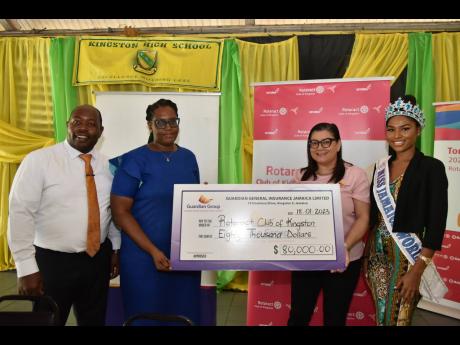Period poverty a harsh reality for many Jamaican girls
Dealing with teenage girls who are ignorant about their menstrual cycle, such as when it is likely to occur and how to cope with it, is almost an everyday occurrence for school nurse Jessica Leslie, who works at Kingston High School on King Street, Kingston.
She shared with The Gleaner on Wednesday that in addition to having to deal with the realities of period poverty, the school has to help the young women to understand what is happening with their bodies.
“Daily you have students coming and asking me, ‘Miss, do you have any pads?’, or ‘Miss you have any napkins to spare?’ I really appreciate the fact that today they were teaching about how to calculate their periods, how to understand their cycle.
“Sometimes when they come to me and I ask, ‘So you didn’t know your period was coming today?’ and they tell me, ‘Miss, I don’t know how to do that or what is that’. So I appreciate the fact that they touched on that specific part of the lesson.”
Nurse Leslie was referring to the explanation by Dr Kimberley Cole who presented on the menstrual cycle, using charts which showed the female reproductive organ.
She was participating in the handover and contract signing ceremony for a sanitary pad dispenser, along with sanitary napkins by the Rotaract Club of Kingston and a symbolic cheque for $80,000 from Guardian Group to restock the dispenser they provided over the next three months.
This is in keeping with Phase II of the Empowered to Flow … Period! Campaign by the Rotaract Club of Kingston to reduce period poverty in non-traditional high schools, with Charlie Smith and Norman Manley high schools also included in the programme.
Close to 80 grade seven girls were in attendance and paid keen attention as Dr Cole explained that the process of menstruation is natural in healthy young girls whose bodies are transitioning to puberty.
“Don’t be afraid. It’s a natural process and can begin as early as age eight or as late as 16 but on average occurs about 12 years of age,” she assured them.
HYGIENE FACILITIESDr Kimberly Cole further explained that menstruation is a process that occurs in every normal female at the beginning of their reproductive cycle.
She told them that the process is controlled by special hormones which are triggered every month, resulting in the lining of the uterus being shed at that time, resulting in their period, if the woman does get impregnated and this happens in a regular cycle, which can range from 21-35 days but on average happens every 28 days.
Using a calendar, she explained how to calculate when it is next likely to occur. She warned them to expect changes in their body – physical and emotional – leading up to the start of the period and during. It is natural for their bodies to feel sensitive, bloated and for some women to suffer severe cramps, dizziness and nausea. It is also natural to feel out of sorts, miserable.
The issue of period poverty – the inability to afford basic feminine sanitary products – is prevalent among the girls at Kingston High, Nurse Leslie admitted.
“We are an inner-city school and sometimes they don’t necessarily have the funds to purchase these items. Sometimes they are also embarrassed because their period might be heavier than usual and they don’t quite understand what kind of napkin to ask for, the different ones for the different flow.”
Period poverty, or the lack of access to menstrual products and hygiene facilities, is a public health crisis that currently affects about 500 million women worldwide as of 2021. According to a study by non-governmental organisation HerFlow founder, Shelly Ann Weekes, conducted through the HerFlow Foundation, 42 per cent of girls in Jamaica suffer from period poverty and have to go without sanitary supplies for months at a time.

